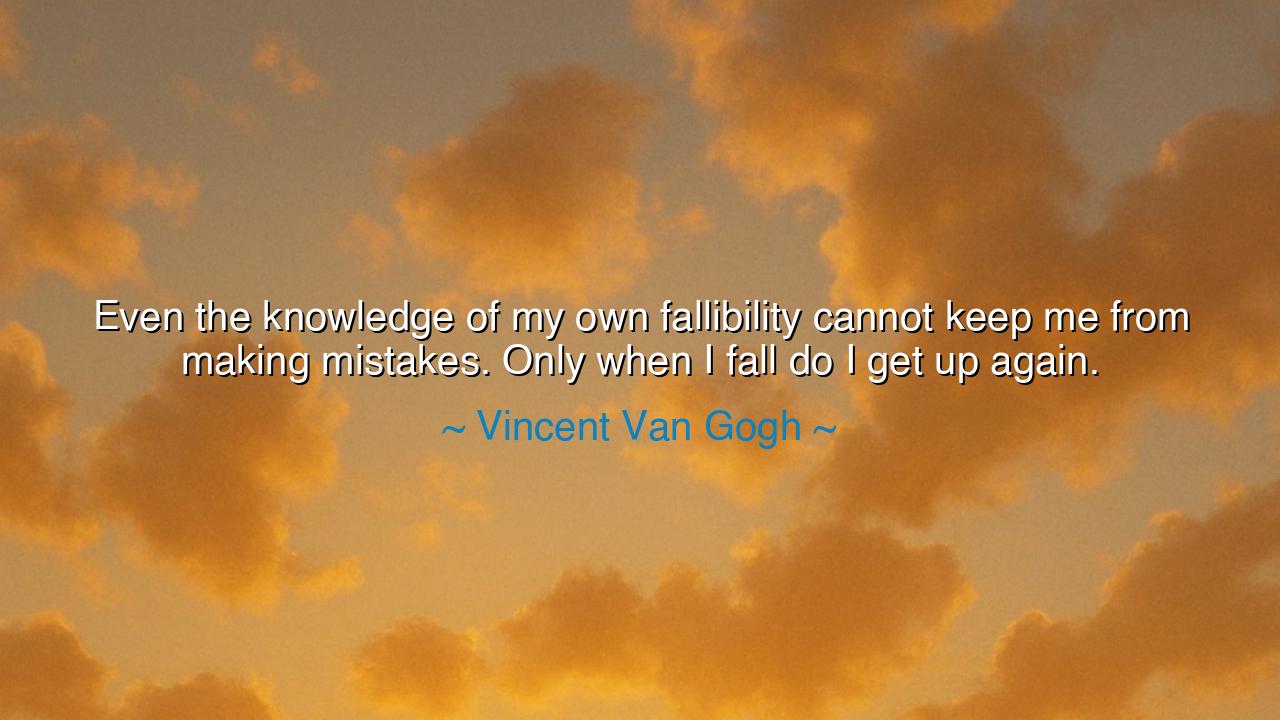
Even the knowledge of my own fallibility cannot keep me from
Even the knowledge of my own fallibility cannot keep me from making mistakes. Only when I fall do I get up again.






Hear the sorrowful yet triumphant words of Vincent Van Gogh, painter of anguish and beauty, who declared: “Even the knowledge of my own fallibility cannot keep me from making mistakes. Only when I fall do I get up again.” In this confession we hear both the cry of a wounded soul and the wisdom of a man who learned through struggle. For he speaks of the eternal condition of humanity: that no matter how deeply we understand our weakness, we cannot escape error. Yet from error arises growth, and from each fall, the strength to rise anew.
The meaning of fallibility here is the recognition that man is flawed, that perfection lies beyond reach. Van Gogh, tormented in mind yet ablaze with vision, knew his limitations more keenly than most. But knowledge of weakness does not shield one from it. To know one is fallible is not to stop the stumble, but to prepare the heart to endure it. The true strength lies not in avoiding all mistakes, but in the resilience to rise after the fall, to continue despite the wound.
The second part of his wisdom—“Only when I fall do I get up again”—reveals the paradox of life: that growth is born from failure, and wisdom is shaped by suffering. Just as the seed must split to become a tree, so must the soul endure breaking to discover its hidden strength. Van Gogh’s own life was filled with failures—poverty, rejection, loneliness—yet in the ashes of these defeats, he painted works of immortal brilliance. His words remind us that the fall is not the end, but the turning point where the upward journey begins.
History, too, offers witness. Consider the life of Abraham Lincoln, who suffered repeated failures in politics and business before rising to the presidency. His defeats did not vanish with the knowledge of his own limits; he stumbled often. But each time, he rose with greater strength, until he became the leader who guided a nation through its darkest trial. His story proves Van Gogh’s truth: knowledge of weakness alone cannot save us, but the will to rise again makes greatness possible.
Even in the realm of science, this wisdom holds. Thomas Edison famously failed hundreds of times before perfecting the light bulb. He did not expect to avoid error; he knew his fallibility. But with each failed experiment, he rose again, learning, refining, persevering. The power of his success lay not in the absence of mistakes, but in his relentless rising after each fall. In this, he lived the spirit of Van Gogh’s words.
The lesson for us, O seekers of truth, is that mistakes are not to be feared, for they are the forge of growth. You will fall, again and again, even knowing your weakness. But each fall is a chance to rise stronger, wiser, and more determined. To remain fallen is defeat, but to rise is victory. The measure of a soul is not whether it stumbles, but whether it chooses to stand again.
Therefore, beloved listeners, let your practice be this: do not despair in your errors, nor condemn yourself for your fallibility. Accept that you will stumble, but vow to rise. Use your failures as stepping stones, your wounds as teachers, your struggles as fires that refine you. And remember Van Gogh’s eternal truth: knowledge of weakness does not prevent mistakes, but each fall carries within it the chance to rise again. Rise, then, each time you stumble, and in rising, you will find the strength and beauty of your truest self.






AAdministratorAdministrator
Welcome, honored guests. Please leave a comment, we will respond soon